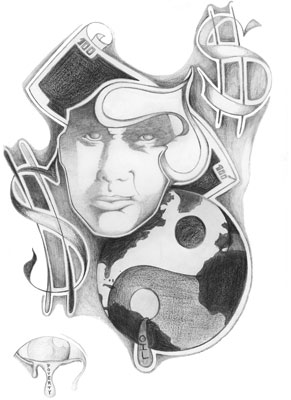All Nonfiction
- Bullying
- Books
- Academic
- Author Interviews
- Celebrity interviews
- College Articles
- College Essays
- Educator of the Year
- Heroes
- Interviews
- Memoir
- Personal Experience
- Sports
- Travel & Culture
All Opinions
- Bullying
- Current Events / Politics
- Discrimination
- Drugs / Alcohol / Smoking
- Entertainment / Celebrities
- Environment
- Love / Relationships
- Movies / Music / TV
- Pop Culture / Trends
- School / College
- Social Issues / Civics
- Spirituality / Religion
- Sports / Hobbies
All Hot Topics
- Bullying
- Community Service
- Environment
- Health
- Letters to the Editor
- Pride & Prejudice
- What Matters
- Back
Summer Guide
- Program Links
- Program Reviews
- Back
College Guide
- College Links
- College Reviews
- College Essays
- College Articles
- Back
Death to Designer
You’re strolling through the mall or scrolling down your internet browser.
What store must you make a detour at or what site do you instantly click to?
In today’s trend-oriented society, a well-known brand name is expected to be your answer.
We’ve all done it at some point in our lives, especially during the holiday season.
Whether you walk away satisfied with a “high-fashion” purchase, settle for seeking a knock off, or hang your head filled with empty dreams, brands almost always come to mind during a shopping spree (and that includes the window kind).
But what is it about designer names that captivates today’s shoppers?
If any Billy Joe Bob were to write his name in Sharpie on a white t-shirt and put it on sale, would closets everywhere suddenly be overflowing with the garment?
As ridiculous as it sounds, this is basically the reality of the world we live in. And while such a realization may be hard for some to swallow, a universal shocker is sure to be where designer threads actually come from.
Bangladesh is a relatively small republic located in South Asia. Though little about the nation is known by the average person, geography enthusiasts aren’t the only ones that can tell you a thing or two about Bangladesh.
It turns out that some of the world’s biggest brands are familiar with the Asian country themselves. Moreover, designer denim-brand G-Star Raw and Wal-Mart both having Bangladeshi affairs is far from a coincidence.
You see, just as any buyer loves a good sale, any corporate official loves a good deal, even those representing a designer. In fact, “higher class” companies have been making the same deals with foreign factories as “bargain brands” have been for years.
Take the previously named Dutch fashion label and worldwide convenience store as an example.
Walmart’s Asda chain and G-Star Raw both sell Bangladesh-produced men’s white t-shirts. The latter, however, sells its t-shirts for $91.25 each, 15 times more than the price of the former’s.
Ralston Fernandez attempted to explain what basically stands as socially-motivated corruption to political blogger and author Bud Meyers.
Senior vice-president for operations at the Bangladeshi buying house ZXY Apparel Buying Solutions, Fernandez stated,
“Brands like Tommy Hilfiger, Calvin Klein or Giorgio Armani have a price point that is higher because the brand has a reputation and that makes a difference.”
With Hilfiger, Klein and Armani all producing garments in Bangladesh alongside much lower priced clothing lines like H&M, Gap and Zara, Fernandez has reason to believe so.
In the eyes of modern buyers, designer names seem to have an appeal that exceeds the bargains other brands can offer.
Going back to G-Star Raw, the company has professed to be one of “designer clothing” since 1989. With this categorization, it has successfully sold its $90 t-shirts and will continue to sell its $90 t-shirts.
All because we let them.
As reported, the origin of this product is nothing special. Its mass production is essentially identical to that of t-shirts sold for six bucks.
But as a society we have been dazzled by this glamorous concept of designer, willing to spend hefty sums for “one of a kind” items that are truly not unique at all.
If you really want to praise a designer, forget Giorgio and Calvin, and recognize the Bangladeshi factory worker who was payed $0.22 an hour to make the denim shirt worth $3.72 hanging in your closet.
I just hope you didn’t hand over a Benjamin for it.

Similar Articles
JOIN THE DISCUSSION
This article has 0 comments.
